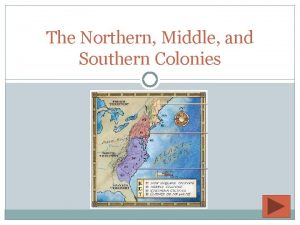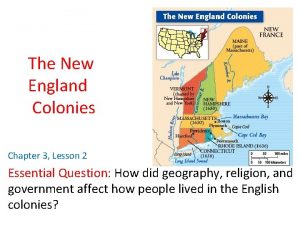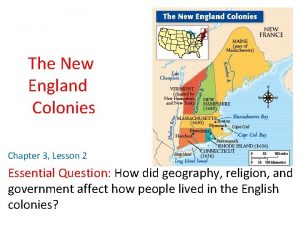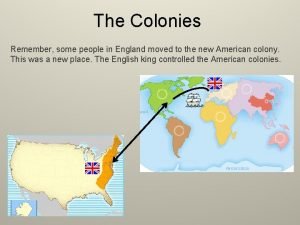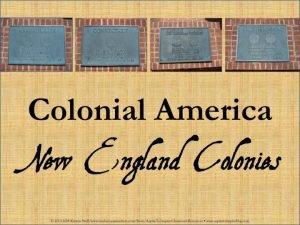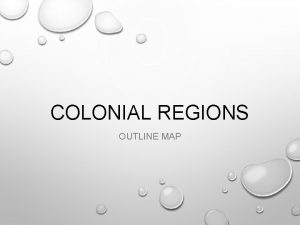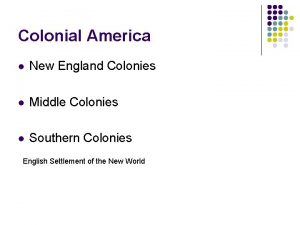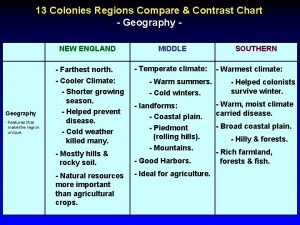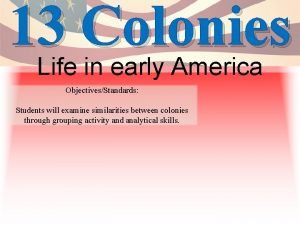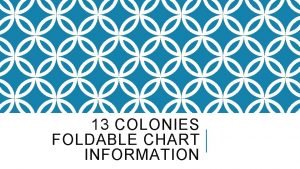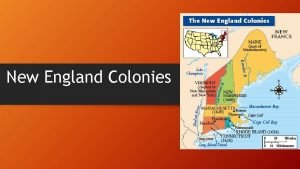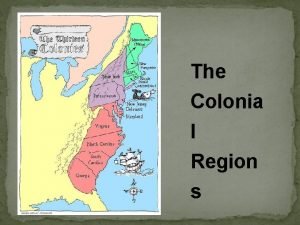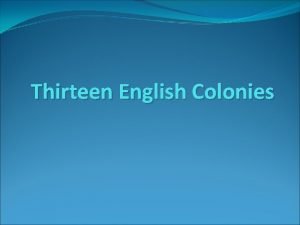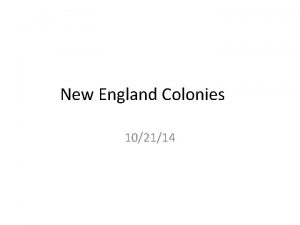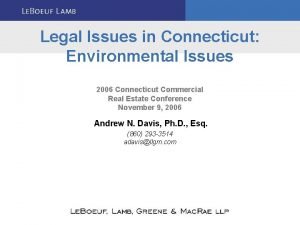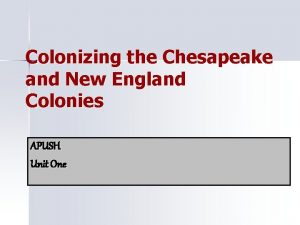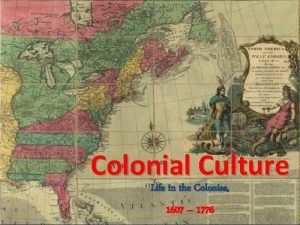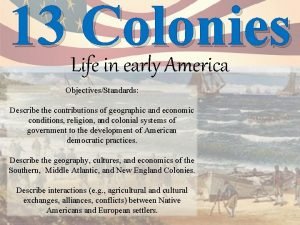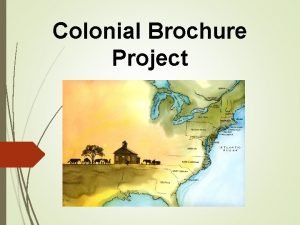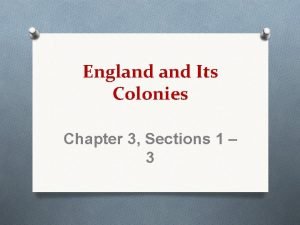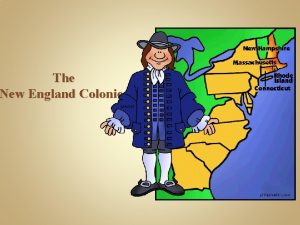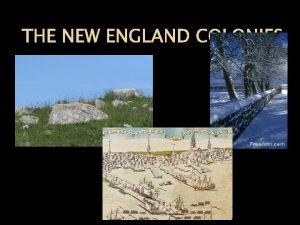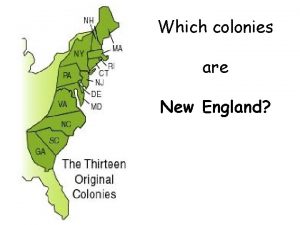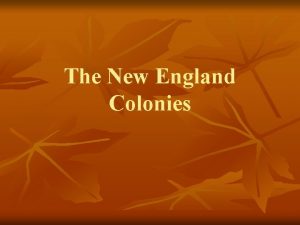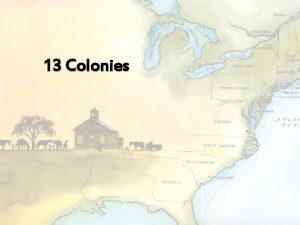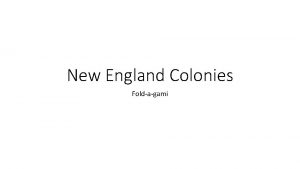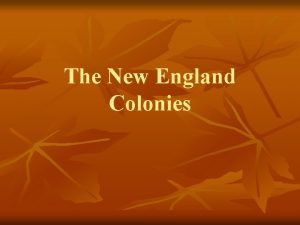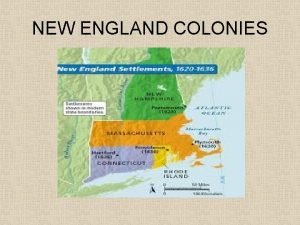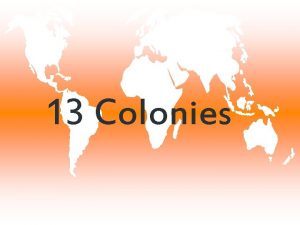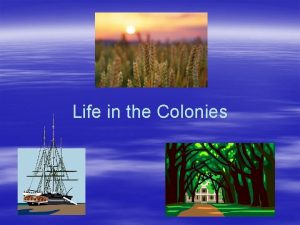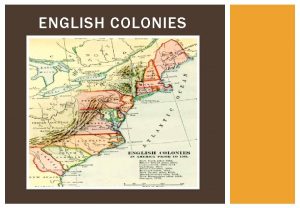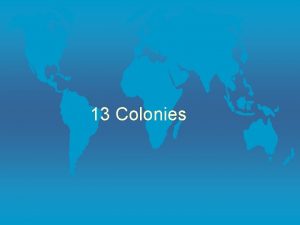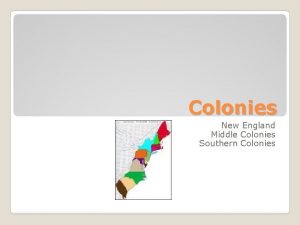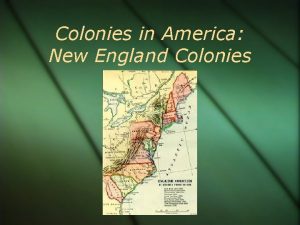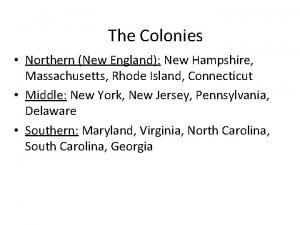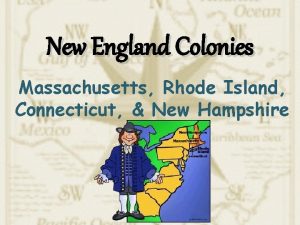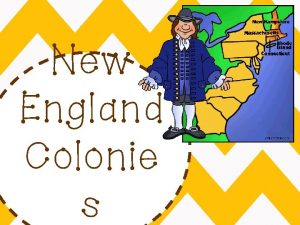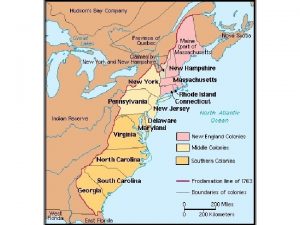Colonies in America New England Colonies o Massachusetts























- Slides: 23

Colonies in America

New England Colonies: o Massachusetts o New Hampshire o Connecticut o Rhode Island Economy: o Fur Trading o Fishing o Lumber Industry o Farming

Rhode Island - Founded by Roger Williams - Land peaceably acquired from Indians - Based on religious freedoms that Williams promoted - Church and the government are separate - Puritan Opinion: “That sewer in which the Lord’s debris had collected and rotted”

Connecticut - Founded by Thomas Hooker - Settled by Dutch and English - Wanted more religious freedom than Massachusetts allowed - Disliked the requirement of citizens to be church members -Fundamental Orders First constitution in the nation Allowed area to be controlled by the citizens

New Hampshire - Founded by Puritan communities - Settled in little towns independent of each other - Led to constant discord within the colony - Famous for raising of flax and manufacturing linen goods - Becomes royal colony

New England Unity: By Choice - New England Confederation - 1643 - Participants: 2 Massachusetts Colonies and 2 Connecticut Colonies (All Puritan) - Purpose: Defend against foes and to deal with internal issues - Organization: Each colony got two votes regardless of population

New England Unity: By Force - Dominion of New England - 1686 - Purpose: To enforce the Navigation Acts - Actions: Got rid of town meetings and put heavy restrictions on all areas of life - Ended when King was overthrown in England - People of Boston overthrew the Dominion

Middle Colonies: o New York o New Jersey o Delaware o Pennsylvania Economy: o Fur Trading o Lumber Industry o Shipbuilding o “Bread Colonies”

New Netherland (New York) - Founded by Henry Hudson -Englishman sailing for the Dutch -Explored the Hudson R. and Hudson Bay areas -Dutch found colony at New Amsterdam (New York City) -Lots of different immigrants -Religious freedom - Very aristocratic population - Purpose of Colony: - Profit from fur trade - Best Deal: - Purchase of Manhattan Island

New York - Problems: - Directors incompetent - Massive attacks from Indians (“Wall Street”) - Attacked by British colonists -English take colony in 1664 -Renamed New York -Part of the region divided into the colony of New Jersey - Dutch influence still evident in America

Pennsylvania - Founded by William Penn -Quakers (Society of Friends) - Religious group who practiced worship without ministers and were pacifists - Refused to support Church of England - No Oaths - Faced much persecution in England

Pennsylvania - Best advertised colony in America - Gave large land grants -Philadelphia “City of Brotherly Love” -Fair treatment of Indians Used as babysitters -Thriving colony Freedom of Worship Representative Assembly No military defense Disliked slavery

Delaware • Settled by the Swedish on property that supposedly belonged to New Netherland • Dutch lead military expedition in 1655 and take over colony • Absorbed into New Netherland

New Jersey - Part of New York at first - Colony had religious liberty - Divisions between Puritans and Quakers (East and West Jersey) - Mostly settled by English - Farming towns - Escaped troubles because guarded on both sides by New York and Pennsylvania

Southern Colonies: o Maryland o South Carolina o North Carolina o Virginia o Georgia Economy: o Farming

Maryland - George Calvert Lord Baltimore: Founder of Colony - Established as safe haven for English Catholics - Catholics soon outnumbered by backcountry planters growing tobacco - Toleration Act guaranteed religious freedom (for all Christians) - Death penalty for all who denied divinity of Jesus

Carolina (South Carolina) -Royal colony named after King Charles - Founded by the Lords Proprietors - Stretched from Atlantic to Pacific - Goal: Grow food to sale to Caribbean -Charles Town became major port city - Main Crop: Rice - Aristocratic population -Large slave populations

Carolina (South Carolina)

Carolina (North Carolina) North Carolina created as refuge for the poor and dissenters - Mainly came from Virginia Small tobacco farms with little need for slaves Remained thinly populated until mid 1700’s “A vale of humility between two mountains of conceit”

Georgia -Georgia Founded by James Olgethorpe Haven for debtors Buffer from Spanish areas Determined to keep slavery out of colony Tolerated all Protestants Last of 13 colonies to be founded in New World Least populated by end of 1700 s

Colonial System -Mercantilism system of nations increasing their wealth and power through trade with colonies -English wanted a favorable balance of trade which meant they sold more than they imported from colonies -Social System widely available prosperity

English Control - Colonies were very successful traders - Lumber, furs, fish, grain, tobacco sent to Europe - Large quantities of finished goods bought - Parliament passes the Navigation Acts Restricted how colonists could do business Colonies could only trade with Britain

Seeds of Independence - Glorious Revolution in England, 1688 -Parliament becomes the dominant force in English government - Salutary Neglect very loose supervision of the colonies - Lack of control led to self government religious, political, economic, and social freedoms John Peter Zenger Trial - Established freedom of the press
 When was the new england colonies founded
When was the new england colonies founded Lesson 2: the new england colonies answer key
Lesson 2: the new england colonies answer key Lesson 2: the new england colonies answer key
Lesson 2: the new england colonies answer key North middle and southern colonies
North middle and southern colonies New england colonies leaders
New england colonies leaders 13 colonies outline map
13 colonies outline map When was the new england colonies founded
When was the new england colonies founded Facts about the new england colonies
Facts about the new england colonies First 13 states
First 13 states New england, middle and southern colonies comparison chart
New england, middle and southern colonies comparison chart Interesting facts about the middle colonies
Interesting facts about the middle colonies Middle colonies pegs
Middle colonies pegs New england rocky soil
New england rocky soil New england colonies terrain
New england colonies terrain Middle colonies climate/geography
Middle colonies climate/geography New england colonies definition
New england colonies definition New england, middle and southern colonies comparison chart
New england, middle and southern colonies comparison chart New england colonies drawings
New england colonies drawings Chesapeake colonies apush
Chesapeake colonies apush New england colonies labor source
New england colonies labor source Middle colonies facts
Middle colonies facts New england region
New england region Colonies brochure project
Colonies brochure project Chapter 3 section 1 england and its colonies
Chapter 3 section 1 england and its colonies
